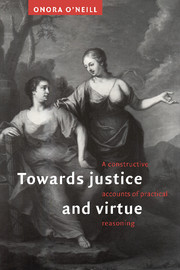Book contents
- Frontmatter
- Contents
- Preface
- Introduction
- 1 Overview: justice against virtue?
- 2 Practical reason: abstraction and construction
- 3 Focus: action, intelligibility and principles
- 4 Scope: agents and subjects: who counts?
- 5 Structure: obligations and rights
- 6 Content I: principles for all: towards justice
- 7 Content II: principles for all: towards virtue
- Bibliography
- Index
3 - Focus: action, intelligibility and principles
Published online by Cambridge University Press: 05 June 2012
- Frontmatter
- Contents
- Preface
- Introduction
- 1 Overview: justice against virtue?
- 2 Practical reason: abstraction and construction
- 3 Focus: action, intelligibility and principles
- 4 Scope: agents and subjects: who counts?
- 5 Structure: obligations and rights
- 6 Content I: principles for all: towards justice
- 7 Content II: principles for all: towards virtue
- Bibliography
- Index
Summary
The four ranges of conceptions of practical reason discussed in chapter 2 grasp action in very different ways. Teleological conceptions of practical reason grasp it by way of the ends or states of affairs of which acts and the sources of action are means or components; act-oriented conceptions by way of the descriptions or principles which it is to embody. There has been a lot of dispute about the adequacy of these ways of focusing on action. In general, universalists and historicizing particularists have thought that a focus on act descriptions is appropriate, although they have disagreed about the sorts of descriptions that are appropriate. But more radical particularists have thought that a focus on principles must lead to ethical and to more general catastrophes; some of them assert simply that there are no moral principles. These issues must be settled before moving on to the construction of an account of ethics.
Action could be guided (to some extent) by fixing the ends it is to achieve, the source from which it is to emerge, or the form it is to take. Different accounts of ethics focus on these different ways of guiding action. Some accounts focus on ethical demands which guide action indirectly by focusing on the ends or results which action is to produce; others do so yet more indirectly by focusing on dispositions or traits of character, from which action and attitudes, and ultimately further ends and results, are to flow.
- Type
- Chapter
- Information
- Towards Justice and VirtueA Constructive Account of Practical Reasoning, pp. 66 - 90Publisher: Cambridge University PressPrint publication year: 1996



